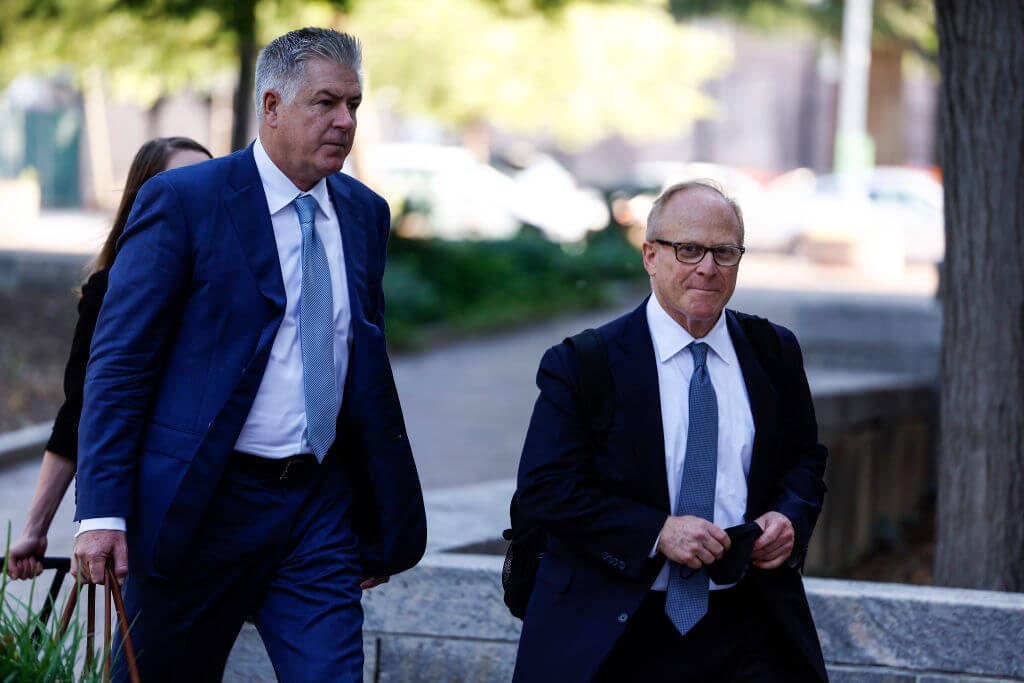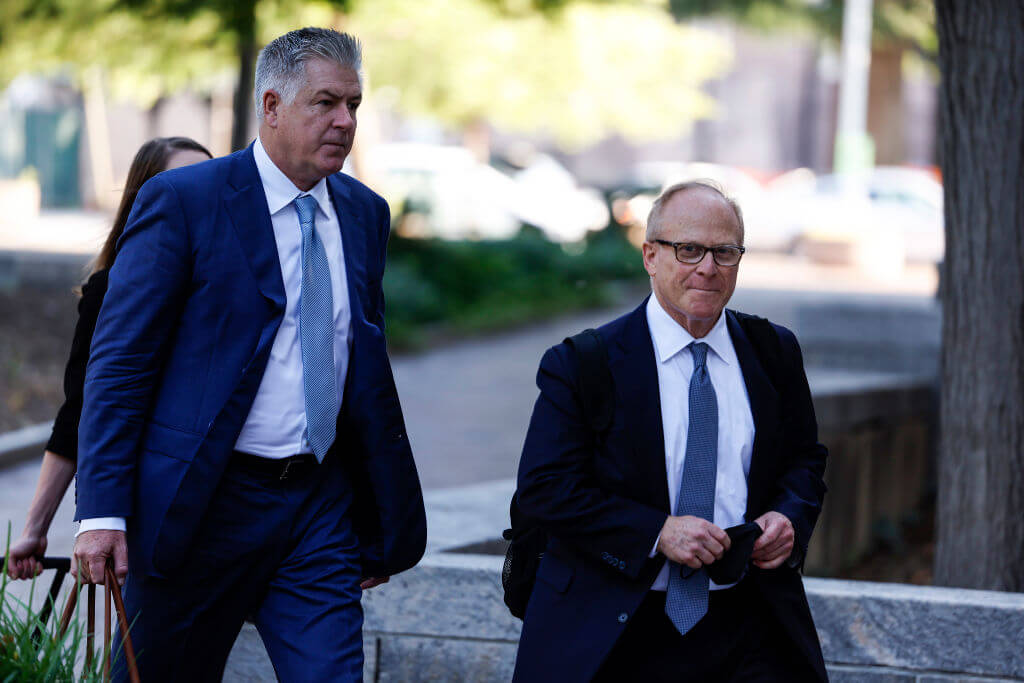Uncategorized
Hezbollah Rebuilds Military Capabilities in Southern Lebanon With Iranian Support Amid US Pressure, Israeli Strikes

Lebanese army members and residents inspect the damages in the southern Lebanese village of Kfar Kila, Lebanon, Feb. 18, 2025. Photo: REUTERS/Karamallah Daher
The terrorist group Hezbollah is rebuilding its military infrastructure in southern Lebanon with Iranian support while openly defying international calls to disarm — a move that has heightened fears of a renewed conflict with Israel and prompted intensified diplomatic efforts by the United States and Egypt to prevent further escalation.
As Lebanon stands on the brink of a major new conflict, the government is intensifying efforts to meet the ceasefire deadline to disarm the Iran-backed terrorist group, while trying to avoid plunging the nation into a civil war.
On Monday, Hezbollah chief Sheikh Naim Qassem once again refused to lay down the Islamist group’s weapons, rebuffinh mounting US pressure and warnings of a possible Israeli military response.
In an interview with the Lebanese outlet Al-Manar, Qassem insisted that the group’s military arsenal is a “legitimate tool for resisting Israel’s occupation and threats.”
“Our weapons are a legitimate means of defending the homeland and our existence,” he said. “There is no separation between our survival and that of the nation, and we reject becoming a target for the enemy’s conditions or calculations.”
The Iranian proxy group also warned that the risk of an escalated conflict “exists,” vowing to defend itself against “Israeli aggression until [its] last breath.” However, Hezbollah also said it has “no intention” of starting a war.
On Tuesday, the Alma Research and Education Center, which focuses on Israel’s security challenges along its northern border, released a new study revealing that Hezbollah, with Iranian backing, has been actively rebuilding its military capabilities, in clear breach of the ceasefire agreement with Israel brokered last year.
According to the report, Hezbollah, with support and sponsorship from the Islamist regime in Tehran, is intensifying efforts to rehabilitate its military capabilities, including the production and repair of weapons, arms and cash smuggling, recruitment and training, and the use of civilian infrastructure as a base and cover for its operations.
Despite suffering heavy losses in its war with Israel, the study also found that the group still maintains several tactical and underground tunnels — among its most valuable assets — particularly in areas where Israeli ground operations did not reach.
“Hezbollah retains operational strike capability in various formats … [but] it does not have broad invasion capability into the Galilee [northern Israel],” the study said.
Tal Beeri, a Middle East expert and author of the report, explained that the Iran-backed terrorist group “is not facing an actual dismantling of its weapons.”
“The State of Lebanon and the Lebanese Armed Forces are limited in their ability and willingness to enforce weapons disarmament, among other reasons due to demographic issues, internal cooperation, fear of confrontation, and accessibility constraints,” Beeri said.
With support from Iran, Hezbollah has prioritized survivability and a shift toward covert operations, using civilian infrastructure and activities as both cover and a base for its military rehabilitation, the report explained.
In recent weeks, Israel has conducted strikes targeting this network, particularly south of the Litani River, where Hezbollah operatives are historically most active against the Jewish state.
For years, Israel has demanded that Hezbollah be barred from carrying out activities south of the Litani, located roughly 15 miles from the Israeli border.
The Lebanese government is now facing mounting pressure from Israeli and US officials to disarm Hezbollah and establish a state monopoly on weapons.
According to Hanin Ghaddar, a senior fellow at the Washington Institute for Near East Policy, Israel appears to be preparing to confront Hezbollah again, following recent military strikes.
“War is coming, unless Lebanon’s leadership wakes up from denial and faces its responsibilities to its own citizens,” Ghaddar said in a post on X.
“What can be done? Start disarming Hezbollah in a more serious way – that is, north of Litani and the Beqaa, while targeting Hezbollah’s political and financial infrastructure,” she continued.
WAR IS COMING…
All signs, the military escalation by the IDF on Hezbollah, the drones flying all over Lebanon, the military exercise held by the IDF north of Israel right on the border of Lebanon, among other red flags, all lead to one conclusion: that Israel is readying for…— Hanin Ghaddar (@haningdr) October 24, 2025
As the Lebanese government pushes to meet a year-end deadline to disarm the terrorist group, the army has been actively dismantling Hezbollah arms caches across the country.
Media reports indicate that the country’s armed forces have reportedly run out of explosives, but operations are set to continue. The army has reportedly been cautious to avoid inflaming tensions, especially among Hezbollah’s Shi’ite base of support, and to buy time for Lebanon’s politicians to reach an agreement about the group’s weapons in other parts of the country.
Earlier this year, Lebanese officials agreed to a US-backed disarmament plan, which called for Hezbollah to be fully disarmed within four months — by November — in exchange for Israel halting airstrikes and withdrawing troops from the five occupied positions in the country’s southern region.
Even though the Lebanese government agreed to a five-stage plan aimed at restoring authority and limiting the influence of the Iran-backed terrorist group, Hezbollah has pushed back against any government efforts, insisting that negotiations to dismantle its arsenal would be a serious misstep while Israel continues airstrikes in the country’s south.
The terrorist group has even threatened protests and civil unrest if the government tries to enforce control over its weapons.
On Monday, US Deputy Middle East Envoy Morgan Ortagus met with Lebanese President Joseph Aoun in Beirut to discuss ongoing disarmament efforts and possible next steps to stabilize the southern region.
According to a press release from his office, Aoun expressed his intention to implement UN Resolution 1701, which would allow the Lebanese army to deploy in the country’s south and ensure that Hezbollah is not armed or present in the area.
Earlier this month, the Trump administration approved $230 million in aid for Lebanon’s security forces to support their efforts to disarm the Iranian proxy.
Last fall, Israel decimated Hezbollah’s leadership and military capabilities with an air and ground offensive, following the group’s rocket and drone attacks on northern Israeli communities — which they claimed were a show of solidarity with the Palestinian terrorist group Hamas amid the war in Gaza.
In November, Lebanon and Israel reached a US-brokered ceasefire agreement that ended a year of fighting between the Jewish state and Hezbollah.
Under the agreement, Israel was given 60 days to withdraw from southern Lebanon, allowing the Lebanese army and UN forces to take over security as Hezbollah disarms and moves away from Israel’s northern border.
However, Israel maintained troops at several posts in southern Lebanon beyond the ceasefire deadline, as its leaders aimed to reassure northern residents that it was safe to return home.
Jerusalem has continued carrying out strikes targeting remaining Hezbollah activity, with Israeli leaders accusing the group of maintaining combat infrastructure, including rocket launchers — calling such activity “blatant violations of understandings between Israel and Lebanon.”
Uncategorized
A border official mocked an attorney for observing Shabbat. Orthodox lawyers say the issue is not new.

Gregory Bovino, the Border Patrol official who led immigration raids in Minneapolis, reportedly mocked the Jewish faith of Minnesota’s U.S. attorney during a phone call with other prosecutors in mid-January. According to The New York Times, Bovino complained that Daniel Rosen, an Orthodox Jew, was hard to reach over the weekend because he observes Shabbat and sarcastically pointed out that Orthodox Jewish criminals don’t take the weekends off.
The call took place at a moment of extreme tension in Minneapolis, as federal agents under Bovino’s command carried out an aggressive immigration crackdown that had already turned deadly. It came between the fatal shootings of Renée Good and Alex Pretti, both killed during enforcement operations, and amid fierce backlash from local officials and residents.
Bovino made the remarks in a derisive, mocking tone, the Times reported, casting Shabbat observance as a point of ridicule. Bovino had already drawn national attention for frequently wearing an olive double-breasted greatcoat with World War II-era styling, leading some critics to call him “Gestapo Greg” and accusing him of “Nazi cosplay.” Bovino, who pushed back on those comparisons, has since been reassigned.
Rosen, a Trump nominee, was confirmed as Minnesota’s U.S. attorney in October 2025 after a career in private practice and Jewish communal leadership. He has said that rising antisemitism helped motivate his decision to take the job, and that prosecuting hate crimes would be a priority for his office.
For many Orthodox Jewish lawyers, Bovino’s alleged remarks were not surprising. They echoed a familiar challenge: explaining that Shabbat — a full day offline — is not a lack of commitment, but a religious boundary that cannot be bent without being broken.
In a profession that prizes constant availability, that boundary can carry consequences. Some lawyers say it shows up in subtle ways: raised eyebrows, jokes about being unreachable, skepticism when they ask for time off. Others say it has shaped much bigger decisions, including how visibly Jewish they allow themselves to be at work.

David Schoen, an Orthodox criminal defense attorney who served as lead counsel for President Donald Trump during his second impeachment trial, said he has long been mindful of how religious observance is perceived in the courtroom.
“I have made a conscious decision not to wear my yarmulke in front of a jury,” Schoen said, explaining that jurors often “draw stereotypes from what they see.”
Those concerns were reinforced by experience. Schoen said he has noticed a “definite difference in attitude” from some judges depending on whether he wore a yarmulke. In one case, he recalled, a Jewish judge pulled him aside during a jury trial and told him she thought he had made the right choice — a comment Schoen said he found disappointing.

For Sara Shulevitz, a criminal defense attorney and former prosecutor, the Bovino episode brought back memories from early in her career.
Orthodox and the daughter of a Hasidic rabbi — now married to one — Shulevitz said her unavailability on Jewish holidays was often treated as a professional flaw rather than a religious obligation. “It held me back from getting promotions,” she said.
In court, the scrutiny could be blunt. “I was mocked by a Jewish judge for celebrating ‘antiquated’ Jewish holidays,” she said, recalling requests for continuances for Shemini Atzeret and Simchat Torah. In another case, she said, a judge questioned her request for time off for Shavuot and suggested she had already “taken off for Passover.”
When another judge assumed Passover always began on the same day in April, “I had to explain the Jewish lunar calendar in the middle of court while everyone was laughing,” she said.
Not every encounter, Shulevitz added, was rooted in hostility. Sometimes judges simply didn’t understand Orthodox practice. When she explained she couldn’t appear on a Jewish holiday, judges would suggest she join the hearing by Zoom — forcing her to explain that Orthodox Jews don’t use electrical devices on Shabbat or festivals.
The misunderstanding often slid into a familiar assumption. “They think you’re lazy,” she said. “It’s not laziness. Any Jewish woman knows how much work goes into preparing for Passover.”
Rabbi Michael Broyde, a law professor at Emory University who studies religious accommodation, said that Bovino’s alleged “derogatory remarks” are “sad and reflects, I worry, the antisemitic times we seem to be living in.”
He added that the criticism of Rosen reflected a basic misunderstanding of how law offices operate, calling it “extremely rare” for a lawyer’s religious practices to interfere with their obligations, especially when senior attorneys delegate work and courts routinely grant continuances.
“No one works 24/7,” Broyde said.
The episode echoed a similar Shabbat-related incident during Trump’s first term. In his 2022 memoir, former Trump trade adviser Peter Navarro described how a group sought to undermine Trump son-in-law Jared Kushner’s role in the 2020 campaign by scheduling a key White House meeting with Trump on a Saturday, knowing Kushner — who is Shabbat observant — would not attend. Navarro titled the chapter recounting the episode, “Shabbat Shalom and Sayonara.”
The tension between Jewish observance and public life is not new. Senator Joe Lieberman, the first observant Jew to run on a major-party presidential ticket, famously walked to the Capitol for a Saturday vote and ate fish instead of meat at receptions. His longtime Senate colleague Chris Dodd joked that he became Lieberman’s “Shabbos goy.”
Still, Schoen said, visibility can cut both ways. During Trump’s impeachment trial, while speaking on the Senate floor, he reached for a bottle of water and instinctively paused. With one hand holding the bottle, he used the other to cover his head — a makeshift yarmulke — before drinking.
The moment was brief, but it did not go unnoticed. In the days that followed, Schoen said he heard from young Jewish men and businesspeople who told him that seeing the gesture made them feel more comfortable wearing their own yarmulkes at work.
The attention, he said, was unexpected. But for some in the Orthodox community, it became a source of pride.
“I felt honored,” Schoen said.
My guess in all seriousness is that he normally wears a yarmulke and this was reflex. Schoen is modern Orthodox so that would make sense. But I defer to @jacobkornbluh https://t.co/MkKx6W03v2
— Jake Tapper 🦅 (@jaketapper) February 9, 2021
Jacob Kornbluh contributed additional reporting.
The post A border official mocked an attorney for observing Shabbat. Orthodox lawyers say the issue is not new. appeared first on The Forward.
Uncategorized
Deni Avdija becomes first Israeli to be selected as an NBA All-Star
(JTA) — Portland Trail Blazers star Deni Avdija’s meteoric rise has officially reached a new stratosphere, as the 25-year-old forward has become the NBA’s first-ever Israeli All-Star.
Avdija was named an All-Star reserve for the Western Conference on Sunday, an expected but deserved nod after the northern Israel native finished seventh in All-Star voting with over 2.2 million votes, ahead of NBA legends LeBron James and Kevin Durant. Avdija’s breakout performance this season has earned him repeated praise from James and others across the league.
Avdija’s star turn began last year in his first season with Portland, when he further captured the adoration of Jewish fans across Israel and the U.S. But he took another step forward this season, averaging 25.8 points, 6.8 assists and 7.2 rebounds per game. His points and assists clips are by far the best of his career, and rank 13th and 12th in the NBA, respectively. He’s considered a front-runner for the league’s Most Improved Player award.
For close observers of Israeli basketball, Avdija’s All-Star selection is the culmination of a promising career that began as a teenage star with Maccabi Tel Aviv and made him the first Israeli chosen in the top 10 in an NBA draft.
“Deni Avdija being named an NBA All-Star reserve is an unbelievable achievement in the mind of every Israeli basketball fan,” Moshe Halickman, who covers basketball for the popular Sports Rabbi website, wrote in an essay for the Jewish Telegraphic Agency. “This is a dream come true for many — a dream that became realistic and even a must-happen during his breakout season — but something that in his first five seasons in the NBA never came across as something that was going to be real.”
Halickman, who has covered Avdija in Washington, D.C., and in Israel, wrote that Avdija is not only considered the greatest Israeli hooper of all time, but perhaps the best athlete to come out of Israel, period.
Oded Shalom, who coached Avdija on Maccabi Tel Aviv’s Under-15 and Under-16 teams, echoed that sentiment in a recent profile of Avdija in The Athletic.
“Even though he is only 25, I think he is Israel’s most successful athlete in history,’’ Shalom said. “We’ve had some great gymnasts — and I hope everyone forgives me for saying it, because we’ve had some great athletes — but I think Deni has become the greatest.”
Avdija’s ascension has also come against the backdrop of the Gaza war and a reported global rise in antisemitism, which he has said affects him personally.
“I’m an athlete. I don’t really get into politics, because it’s not my job,” Avdija told The Athletic. “I obviously stand for my country, because that’s where I’m from. It’s frustrating to see all the hate. Like, I have a good game or get All-Star votes, and all the comments are people connecting me to politics. Like, why can’t I just be a good basketball player? Why does it matter if I’m from Israel, or wherever in the world, or what my race is? Just respect me as a basketball player.”
Now, Avdija’s talents will be on display at the NBA All-Star Game, on Sunday, Feb. 15, in Los Angeles.
The post Deni Avdija becomes first Israeli to be selected as an NBA All-Star appeared first on The Forward.
Uncategorized
Democratic leader says GOP-led Congress boosted ICE funding while Jewish security is underfunded

House Democratic Leader Hakeem Jeffries used a Jewish gathering in New York on Sunday to spotlight what he described as an imbalance in federal priorities, building on outrage over the Trump administration’s violent crackdown in Minneapolis that resulted in two fatal shootings.
Jeffries criticized the Republican-controlled Congress for boosting immigration enforcement funding by billions while, he said, security funding for Jewish institutions continues to lag amid rising antisemitic threats. He said that in the One Big Beautiful Bill Act, which passed last July and included cuts to Medicaid, the Department of Homeland Security received an additional $191 billion, including $75 billion for ICE.
“If that can happen, then the least that we can do is ensure that this vital security grant program is funded by hundreds of millions of dollars more to keep the Jewish community and every other community safe,” Jeffries said.
The Nonprofit Security Grant Program, established by Congress in 2005 and administered by FEMA under the Department of Homeland Security, provides funding to nonprofits, including houses of worship, to strengthen security against potential attacks. Congress began significantly increasing funding in 2018 after a wave of synagogue attacks nationwide, bringing the program to $270 million today.
Major Jewish organizations are pushing to raise funding to $500 million amid rising antisemitic threats. Last year, the Trump administration briefly froze the program as part of broader agency cuts, and some groups have been reluctant to apply because applicants must affirm cooperation with federal immigration enforcement.
Jeffries said House Democrats strongly support an increase to $500 million annually to meet escalating security needs. “It’s got to be an American issue, because that is what combating antisemitism should be all about,” he said.
The breakfast, previously held at the offices of the UJA-Federation of New York, was held this year for the first time in the events hall at Park East Synagogue, which was the site of a pro-Palestinian protest last year that featured antisemitic slogans and posters.
Sunday’s program also included remarks from Senate Minority Leader Chuck Schumer, who told the audience that his support for Jewish security funding will only continue growing under his leadership, calling it his “baby.”
“As long as I’m in the Senate, this program will continue to grow from strength to strength, and we won’t let anyone attack it or undo it,” Schumer said.
Rep. Jerry Nadler, the co-chair of the Congressional Jewish Caucus who is retiring at the end of the year after 36 years in the House, also spoke at the event. Nadler, like several other Democrats in recent months, compared the actions of ICE agents to the Gestapo, Nazi Germany’s secret police. The comparison has drawn sharp criticism from Democrats, Republicans and Jewish leaders.
Support for Israel aid

Both Schumer and Jeffries vowed in their remarks to continue supporting U.S. military assistance to Israel, amid increasing calls within the party for sharper opposition to Israel. Polls show that Democratic voters are increasingly sympathetic to Palestinians. In July, a record 27 Senate Democrats, a majority of the caucus, supported a pair of resolutions calling for the blocking of weapons transfers to Israel.
“I think it’s the humane thing to do to ensure that Israel has a right to exist as a Jewish and democratic state and eternal homeland for the Jewish people,” Jeffries said. The House Minority Leader, who has cultivated close ties with Jewish leaders since his election in 2012, noted that he has visited Israel nine times. He recalled that on his recent trip, Israel’s ambassador to the U.S., Yechiel Leiter, joked that it might be time for Democrats to buy property in Jerusalem.
Schumer, the nation’s highest-ranking Jewish elected official, has seen his popularity decline and has faced calls to step down from his role as leader. On Sunday, he pledged that he “will always fight to give Israel what it needs to protect itself from the many who want to wipe Israel off the face of the map.”
The post Democratic leader says GOP-led Congress boosted ICE funding while Jewish security is underfunded appeared first on The Forward.


